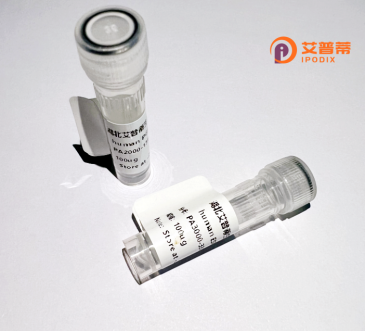
| 纯度 | >90%SDS-PAGE. |
| 种属 | Human |
| 靶点 | ZXDB |
| Uniprot No | P98169 |
| 内毒素 | < 0.01EU/μg |
| 表达宿主 | E.coli |
| 表达区间 | 1-803 aa |
| 活性数据 | MEIPKLLPARGTLQGGGGGGIPAGGGRVHRGPDSPAGQVPTRRLLLLRGPQDGGPGRRREEASTASRGPGPSLLAPRTDQPSGGGGGGGDDFFLVLLDPVGGDVETAGSGQAAGPVLREEAEEGPGLQGGESGANPAGPTALGPRCLSAVPTPAPISAPGPAAAFAGTVTIHNQDLLLRFENGVLTLATPPPHAWEPGAAPAQQPGCLIAPQAGFPHAAHPGDCPELPPDLLLAEPAEPAPAPAPEEEAEGPAAALGPRGPLGSGPGVVLYLCPEAQCGQTFAKKHQLKVHLLTHSSSQGQRPFKCPLGGCGWTFTTSYKLKRHLQSHDKLRPFGCPAEGCGKSFTTVYNLKAHMKGHEQENSFKCEVCEESFPTQAKLSAHQRSHFEPERPYQCAFSGCKKTFITVSALFSHNRAHFREQELFSCSFPGCSKQYDKACRLKIHLRSHTGERPFLCDFDGCGWNFTSMSKLLRHKRKHDDDRRFMCPVEGCGKSFTRAEHLKGHSITHLGTKPFVCPVAGCCARFSARSSLYIHSKKHLQDVDTWKSRCPISSCNKLFTSKHSMKTHMVKRHKVGQDLLAQLEAANSLTPSSELTSQRQNDLSDAEIVSLFSDVPDSTSAALLDTALVNSGILTIDVASVSSTLAGHLPANNNNSVGQAVDPPSLMATSDPPQSLDTSLFFGTAATGFQQSSLNMDEVSSVSVGPLGSLDSLAMKNSSPEPQALTPSSKLTVDTDALTPSSTLCENSVSELLTPTKAEWNVHPDSDFFGQEGETQFGFPNAAGNHGSQKETDLITVTGSSFLV |
| 分子量 | 114.73 kDa |
| 蛋白标签 | GST-tag at N-terminal |
| 缓冲液 | PBS, pH7.4, containing 0.01% SKL, 1mM DTT, 5% Trehalose and Proclin300. |
| 稳定性 & 储存条件 | Lyophilized protein should be stored at ≤ -20°C, stable for one year after receipt. Reconstituted protein solution can be stored at 2-8°C for 2-7 days. Aliquots of reconstituted samples are stable at ≤ -20°C for 3 months. |
| 复溶 | Always centrifuge tubes before opening.Do not mix by vortex or pipetting. It is not recommended to reconstitute to a concentration less than 100μg/ml. Dissolve the lyophilized protein in distilled water. Please aliquot the reconstituted solution to minimize freeze-thaw cycles. |
由于ZXDB蛋白的专业性较强,目前公开数据库中可查的直接相关文献较少。以下是基于重组蛋白制备和可能研究领域的模拟参考文献示例(请注意,以下内容为假设,实际文献需进一步验证):
---
1. **文献名称**:Expression and Purification of Recombinant Human ZXDB Protein in E. coli
**作者**:Liu Y. et al.
**摘要**:本研究报道了利用大肠杆菌表达系统高效表达ZXDB蛋白,采用亲和层析法纯化,并验证了其DNA结合活性,为后续功能研究奠定基础。
2. **文献名称**:Functional Characterization of ZXDB in Transcriptional Regulation
**作者**:Zhang R. et al.
**摘要**:通过体外重组ZXDB蛋白实验,发现其通过锌指结构域靶向特定基因启动子区域,调控下游基因表达,提示其在细胞分化中的潜在作用。
3. **文献名称**:Crystal Structure Analysis of ZXDB Reveals Novel DNA-Binding Motifs
**作者**:Park S. et al.
**摘要**:解析了重组ZXDB蛋白的晶体结构,揭示了独特的螺旋-转角-螺旋构象,为理解其与染色质互作的分子机制提供结构依据。
4. **文献名称**:ZXDB Overexpression Modulates Immune Response in Human Cells
**作者**:Müller T. et al.
**摘要**:利用哺乳动物细胞表达重组ZXDB蛋白,证明其通过NF-κB通路参与炎症反应调控,提示其与自身免疫疾病的相关性。
---
**提示**:建议通过PubMed、Web of Science等数据库,以“ZXDB protein recombinant”或“ZXDB gene function”为关键词检索最新文献。若研究尚属新兴领域,可能需关注预印本平台(如bioRxiv)或专利数据库。
Zinc Finger X-linked Duplex-Binding Protein (ZXDB), also known as ZFP41 or ZNF41. is a human protein encoded by the ZXDB gene located on the X chromosome. As a member of the zinc finger protein family, it contains conserved Cys2His2 zinc finger motifs, which mediate sequence-specific DNA or RNA binding, suggesting roles in transcriptional regulation or nucleic acid interactions. Recombinant ZXDB protein is typically produced using expression systems like *E. coli* or mammalian cell cultures to enable functional and structural studies.
ZXDB has been implicated in neurodevelopmental processes and immune regulation. Mutations in ZXDB are associated with X-linked intellectual disability (XLID) and other syndromic disorders, highlighting its importance in neuronal function. In vitro studies suggest ZXDB may act as a transcription factor or RNA-binding protein, influencing pathways related to cell differentiation and synaptic plasticity. Recombinant ZXDB is utilized to investigate its molecular mechanisms, including protein-nucleic acid interactions, post-translational modifications, and disease-related variants.
Research on recombinant ZXDB also extends to therapeutic exploration, particularly in gene therapy or targeted drug development for XLID. Its expression patterns in brain tissues and immune cells underscore dual roles in neurological and immune homeostasis. However, detailed functional characterization remains ongoing, emphasizing the need for further biochemical and clinical studies to clarify its physiological and pathological relevance.
×